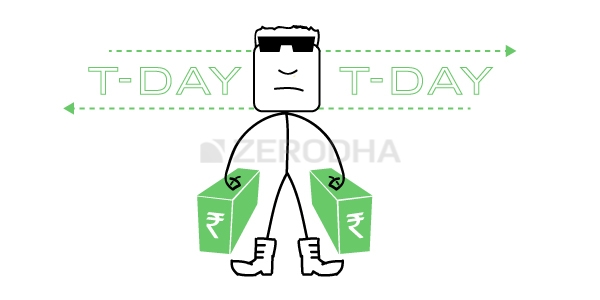How to See the Same Share Bought Again in Zerodha Which Is Not Showing
ten.ane – Overview
While clearing and settlement are quite theoretical, it is important to empathise the mechanics behind it. Equally a trader or an investor, you need not actually worry about how the trades are cleared and settled equally in that location are professional intermediaries to comport out this part seamlessly for you.
However, the lack of understanding of the clearing and settlement procedure could exit a void, and would not give a sense of completeness to the learning procedure. Hence, for this reason, we will explore what happens backside the scene from the fourth dimension yous buy a stock to the fourth dimension it hits your DEMAT account.
Nosotros will keep this very practical with a clear accent on what you should actually know as a market participant.

10.2 – What happens when you buy a stock?
Solar day 1 – The trade (T Day), Mon
Assume on 23rd June 2022 (Monday) you purchase 100 shares of Reliance Industries at Rs.one,000/- per share. The total buy value is Rs.100,000/- (100 * 1000). The day you make the transaction is referred to every bit the trade date, represented every bit 'T Day'.
By the stop of trade day, your broker will debit Rs.100,000/- and the applicable charges towards your purchase. Assuming the trade is executed through Zerodha, the applicable charges would be as follows:
| Sl No | Chargeable Particular | Applicable Charges | Amount |
|---|---|---|---|
| 01 | Brokerage | Zero charges on Equity Commitment or 0.03% or Rs.20/- whichever is lower for intraday trades | Zip |
| 02 | Security Transaction Charges | 0.1% of the turnover | 100/- |
| 03 | Transaction Charges | 0.00325% of the turnover | 3.25/- |
| 04 | GST | 18% of Brokerage + Transaction charges | 0.585/- |
| 07 | SEBI Charges | Rs.x per crore of transaction | 0.one/ |
| Total | 103.93/- | ||
And then an amount of Rs.100,000/- plus Rs.103.93/- (which includes all the applicative charges) totalling Rs.100,103.93/- will be debited from your trading account the day you make the transaction. Think, the money goes out of your account, but the stock has non come into your DEMAT account notwithstanding.
As well, on the aforementioned day, the broker generates a 'contract note' and sends you a copy. A contract notation is like a pecker generated detailing every transaction you made. This is an important document that is worth saving for hereafter reference. A contract notation typically shows a interruption up of all transactions washed during the day along with the merchandise reference number. It besides shows the breakup of charges charged past the banker.
Day 2 – Trade Day + 1 (T+ day, Tuesday)
The twenty-four hour period afterwards you lot made the transaction is called the T+i day. On T+ane twenty-four hour period, you can sell the stock that you purchased the previous day. If you lot do so, you are basically making a quick merchandise called "Buy Today, Sell Tomorrow" (BTST) or "Acquire Today, Sell Tomorrow" (ATST). Recall the stock is not in your DEMAT business relationship all the same. Hence, at that place is a risk involved, and yous could be in problem for selling a stock that you don't really own. This doesn't mean, every time y'all brand a BTST trade, you terminate upwardly in trouble, but it does one time in a fashion, especially when you trade B group and illiquid stocks. This happens a little convoluted, and we deliberately will not touch this topic now.
If yous start fresh in the markets, I would suggest you exercise not make BTST trades unless you understand the gamble involved.
From your perspective, nothing happens on T+i day. However, in the background, the money required to buy the shares is collected past the exchange and the substitution transaction charges and Security transaction tax.
Solar day three – Merchandise Twenty-four hours + two (T+ii 24-hour interval, Wednesday)
On day 3 or the T+2 solar day, effectually 11 AM shares are debited from the person who sold you the shares and credited to the brokerage with whom you lot are trading, who will in turn credit it to your DEMAT account by the end of the day. Similarly, coin that was debited from you is credited to the person who sold the shares.
The shares will now start reflecting in the DEMAT account indicating that yous own 100 shares of Reliance.
So for all practical purposes, if you buy a share on day T Day, yous can wait to receive the shares in your DEMAT account only by the end of T+2 day. The shares are available for a transaction on T+3day.
10.iii – What happens when you sell a stock?
The solar day y'all sell the stocks is again called the trading twenty-four hour period, represented as 'T Day'. The moment you sell the stock from your DEMAT account, the stock gets blocked. Before the T+ii twenty-four hour period, the blocked shares are given to the exchange. On T+2 day you would receive the funds from the sale which will be credited to your trading account after deduction of all applicable charges.
Key takeaways from this affiliate
- The day you brand a transaction, it is called the trade appointment, represented every bit 'T Solar day.'
- The banker is required to consequence you a contract note for all the transactions carried out past the end of T twenty-four hours.
- When y'all purchase a share, the aforementioned will exist reflected in your DEMAT account by the terminate of T+2 day.
- All equity/stock settlements in India happen on a T+two ground.
- When you sell shares, the shares are blocked immediately and the sale proceeds credited again on T +two day
Source: https://zerodha.com/varsity/chapter/clearing-and-settlement-process/
0 Response to "How to See the Same Share Bought Again in Zerodha Which Is Not Showing"
Post a Comment